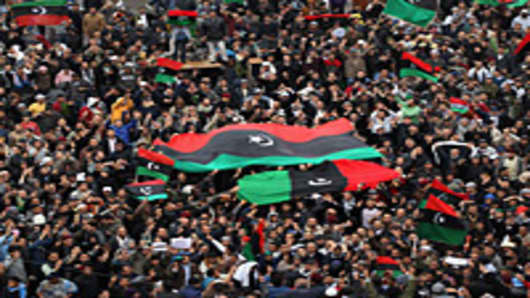The Line: The Antiseptic and Effect No-Zone Zone
Those who seek U.S. intervention in the conflict in Libya are pressing an argument that both understates the risks of a ‘no-fly zone’ and overstates it’s likely effectiveness. Some of the common arguments: a no-fly zone doesn’t amount to war; it can be implemented with minimal violence; it will be an effective means of minimizing the killings of Libyan innocents; and it will lead to the ousting of Gaddafi. Most importantly, it won’t lead to a broader war—especially not troops on the ground—against Gaddafi.
The Magical Thinking of a Non-Violent No-Fly Zone
Nicholas Kristof of the New York Times is becoming a leading advocate of The Line. In his column today he quotes from an Air Force General named Merrill McPeak who argues that the mere announcement of a no-fly zone “might have an impact.” General McPeak says that Libyan pilots fearing interception by US forces might refuse to drop bombs and be more inclined to defect.
See how easy that would be? All we have to do is officially mutter the words ‘no-fly zone’ and the spell is cast. We can win a war without fighting. Because we’re wizards.
I’m surprised McPeak managed not to use the phrase “cakewalk.”
Sanctions Are Ineffective
The front page story describing the “hoard of cash” that Gaddafi supposedly has in Libya is allegedly enabling him “to prolong his fight against rebel forces despite an international freeze on many of the Libyan government’s assets. The source of this information is “American and other intelligence officials”—in other words, professional spies. Of course, spies would never deceive us.
The very premise of the article misstates the reasons for freezing Libyan assets. No one in their right mind ever supposed that freezing Gaddafi's assets would cripple his fighting capabilities. The point was to make sure that we simply weren’t aiding those efforts by providing Gaddafi with funds. And, of course, to provide a way for the international community to give active expression to its moral condemnation of Gaddafi. Mission accomplished.
If We Don’t Do No-Fly, Our Military Sucks.
Back to Kristof’s General, McPeak. It’s clearly disturbing to hawks that so much of the resistance to imposing a no-fly zone is coming from the ranks of the military. To bring around the generals, McPeak proposes a threat—defund the military.
“If we can’t impose a no-fly zone over a not even third-rate military power like Libya, then we ought to take a hell of a lot of our military budget and spend it on something usable,” McPeak says.
Hit ‘em where it counts, General—in the wallet.
A Loose Tongue Lets the Lie of the Line Slip
Not all advocates of a no-fly zone are willing to pretend it will be easy, bloodless and not lead to further escalation. D.B. Grady, a former paratrooper with U.S. Army Special Operations Command and a veteran of Afghanistan, has written an article called “Why A Libyan No-Fly Zone Is Worth The Risks” that gives away the game.
“But once the first U.S. missile strikes the first Libyan target, the shock is gone and the stage is set for continued operations. It's far easier to launch the second missile,” Grady writes.
And once we’re bombing Libya, it’s far easier to escalate further.
The Antidote to the Line
My brother Tim Carney has written a column for the Washington Examiner that bluntly explains: “A no-fly zone in Libya would mean war.”
Read the whole thing. But here’s the bottom line:
Many commentators, hoping a no-fly zone would end Gadhafi's air attacks on protesters and rebels, point to the decade-long no-fly rules the United States enforced in Iraq. But Michael Knights, a leading expert on no-fly zones, says that the Iraq model is neither apt nor desirable. Knights, a Lafer fellow in the Washington Institute's Military and Security Studies Program, wrote his doctoral dissertation on no-fly zones. He says enforcing a no-fly zone "is basically an act of war."
Secretary of Defense Robert Gates seems to agree. "A no-fly zone begins with an attack on Libya to destroy the air defenses." This would include—as Kerry put it on CBS on Sunday—"cratering their runways" to ground their jets. "An attack on Libya," as Gates puts it, which would mean dropping bombs or shooting rockets, is pretty hard to distinguish from war.
On Iraq, it's crucial to remember our no-fly zone there followed Operation Desert Storm—an invasion of Iraq. Knights told me that "no-fly zones are best utilized in countries that you already have quasi-war relations with," either following a war like Desert Storm or as "preparatory actions" for a war.
__________________________________________
Questions? Comments? Email us atNetNet@cnbc.com
Follow John on Twitter @ twitter.com/Carney
Follow NetNet on Twitter @ twitter.com/CNBCnetnet
Facebook us @ www.facebook.com/NetNetCNBC



